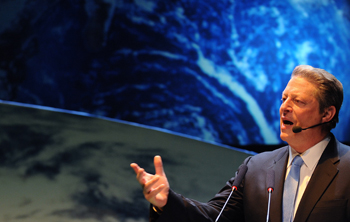THE HAGUE - The mainstream news media, particularly in the Western world, have been accused of ignoring or down playing most development-oriented issues such as poverty, hunger, health care, population and gender empowerment -- primarily because they are stories that are not "sexy" or headline-grabbers.
They just don't sell newspapers because they are either dull or make tedious reading. In most mainstream US newspapers, the underlying theme is: if it bleeds, it leads. The New York Times, however, has always claimed it believes in "all the news that's fit to print." Perhaps it is an exception.
Still, the issues that are ignored in most newspapers are of extreme concern to most developing nations caught up in a rash of new crises relating to food, energy, capital markets and development aid. Add one more to that long list of non-stories -- climate change -- which is one of the critical issues facing both developed and developing nations in the next decade.
 |
| Former US Vice-president Al Gore speaks during The Climate Project conference in Seville on October 18, 2008. The Climate Project consists of 2,500 dedicated volunteers from throughout the United States, Australia, Canada, India, Spain, and the UK, trained by Gore to educate the public about climate change. AFP |
As the UN points out, glaciers are melting at unprecedented rates, threatening freshwater resources; erratic rainfall and extreme weather linked to climate change are jeopardising agriculture, aggravating the food crisis and undermining international efforts to eradicate global hunger.
At a seminar last week in the Hague, the world's judicial capital, the spotlight was on the role played by the world media on climate change. Is it doing enough to draw attention to the threats posed to humanity by global warming and environmental degradation?
As Sabina Voogd of OxfamNovib put it: "When reporting on climate change the media present us more often with lonely polar bears on ice shelves than with all these people in developing countries that already suffer from longer periods of drought, extreme floods, and sudden cold spells."
How are these environmental stories playing in the media, specifically in the mainstream media, which still believe that climate change is mostly a non-story unless there is a political twist to it? Even when the UN Security Council took up the issue of climate change last year -- the only time it went on the Council agenda -- there was no extra ordinary interest in the story.
Looking at the issue from the perspective of a journalist, Lynette Thorstensen, Managing Director, Communications at the World Business Council for Sustainable Development, pointed out that a "consummate story teller" may succeed in selling a story to any newspaper. She admitted that some newspapers view climate change as "dull, tedious and technical", but it depends on the story teller to make it a more an interesting read. An equally interesting proposition is to pursue the electronic media as a platform for spreading the word on climate change. The growing new generation is reading fewer and fewer newspapers but accessing information primarily through the internet.
As Africa -- the most vulnerable continent -- experiences an increase of temperatures of about 0.7 degrees celsius, it will face a whole range of negative impacts, including increased desertification and water shortages leading to decreases in food production, more floods and inundation of its coastal zones and deltas. Many African countries have already been hit by natural disasters such as floods in Mozambique and droughts in the Sahel region.
In the future, warns the UN, the current vulnerability will increase as global warming continues and rainfall decreases. "There is no quick and simple technological fixes to climate change, but rather, there is a whole portfolio of things that countries need to do to mitigate the causes of climate change by reducing harmful emissions and to adapt to changing realities such as higher sea levels or increased aridity that are due to climate change," the UN argues.
And there are reports that the current global financial crisis will not only impact on development aid but also on climate change. Last week Secretary-General Ban Ki-moon appealed to the 27-member European Union (EU) for assistance by pointing out "the paramount importance of concluding the EU energy and climate package within the agreed timeline of December of this year."
He highlighted that this was a much-needed positive signal to the international community and developing countries in particular -- as it negotiates a new, ambitious post-2012 agreement on climate change to be concluded in Copenhagen at the end of next year.
While he sympathized with EU members who may find it challenging to be as ambitious in such times of economic constraint and uncertainty, he suggested that the EU's forward looking policy has the potential to deliver a clean economic growth, which will create millions of new jobs.
"Thus, the current financial turmoil is not a justification for delaying action on climate change, but rather an opportunity to address both the financial and climate change crises that we face," the Secretary-General said in a letter to the EU.
Unfortunately that message -- which describes climate change as one of "the defining issues of our time" -- is lost in the media. Still, even if the news media say they are doing their best-- the best is not good enough.
| 
